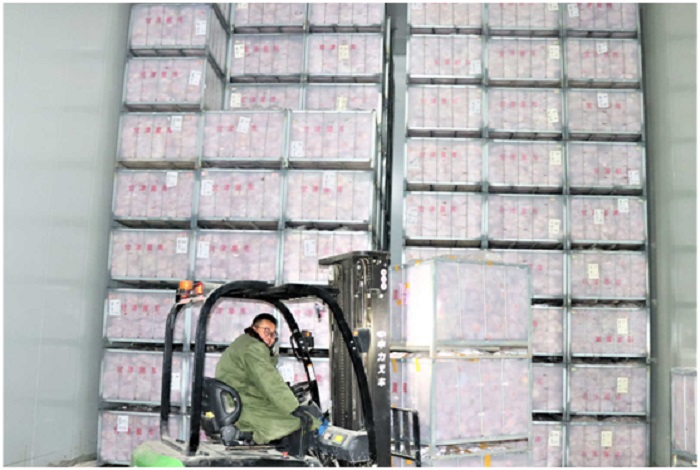



Thanks to the introduction of cold stores into a farmers’ market in Yugan county, east China’s Jiangxi province, Ju Dejin, a fish farmer who raises soft-shelled turtle at a modern agricultural demonstration park in Yugan county, now only needs to deliver products to the farmers’ market twice a week.
In the past when there was no cold storage in the market, Ju had to take the first batch of soft-shelled turtles to the market very early in the morning, and deliver the rest of the goods for the day to the market in small batches for many times, according to Ju.
Recently, a batch of facilities for cold chain logistics backbone network worth 2 billion yuan ($310 million) have been officially put into operation in Jiangxi. Such facilities deployed in cities, counties, and villages guarantee instant transportation and delivery of fresh food and have offered easier access to fresh food for urban and rural residents.
The farmers’ market in Yugan county is the largest fair of aquatic products in Jiangxi. Tens of thousands of tons of aquatic products are sent from the fair to various areas of China every day.
“As cold stores were not available in the past, we could only purchase 100 to 150 kg of aquatic products at a time. Even so, there were usually losses before we could sell them all,” said Zhang Jianfu, a seller at the farmers’ market in Yugan county, who disclosed that they can now purchase ten times the aquatic products they used to buy at a time without worrying about food spoiling easily as cold stores have been built.
Merely about two hours after Jiangxi Supply and Storage Logistics Co., Ltd., a logistics services provider based in Nanchang city, capital of Jiangxi province, loaded fresh food onto cold chain trucks, the batch of fresh food was seen on the shelves of supermarkets in Nanchang and other cities.
The company has so far established cold stores covering a total area of about 2,500 square meters, each of which can store as much as 5,000 tons of products.
Fresh agricultural products distribution and cold chain logistics system construction represent an important part of rural vitalization as well as an effective solution to bringing fresh agricultural products to consumers.
In recent years, various parts of China have vigorously built modern agricultural products circulation networks that are centered on cold chain logistics and feature joint development of multiple forms of logistics through establishing specialized cold chain logistics companies and strengthening the construction of cold chain logistics infrastructure.
Yengisar county located in Kashgar prefecture, northwest China’s Xinjiang Uygur autonomous region, one of the last counties that shook off poverty in Xinjiang, has more than 400 years of history of apricot cultivation. Almost every household in the county grows apricot trees.
However, the county’s fresh apricots ran into difficulty reaching more consumers due to short shelf life and long transportation distance.
To address the issue, Xinjiangguoye, a forestry and fruit company in Xinjiang, built in the county an automatic sorting production line and nine nitrogen filling packaging lines in 2019.
After being automatically sorted out, fresh apricots are packaged up in egg-carton boxes filled with nitrogen, which can prolong the lifetime of apricots on shelves from 7 days to 25 days.
Meanwhile, the company uses ice packs, absorbent cotton wool, and shockproof cotton to protect apricots during transportation and guarantee the products are still fresh even after long distance transport.
According to an executive of the company, it has introduced a new type of intelligent and multifunctional reefer truck that is equipped with technologies enabling comprehensive preservation, intelligent network connection and cloud platform management to bring Xinjiang’s fruits to other areas of China.
In July 2019, the new-type reefer truck brought 30 tons of apricots from Yengisar county all the way to Beijing for sale.
“We are no longer worried about the sale of apricots. Last year, the apricots we planted brought us an income of nearly 20, 000 yuan,” said an apricot grower in Yengisar county confidently.


The Executive and members of the.


The Acting Director, FCT Directorate of.


President Bola Ahmed Tinubu has been.



Barely a month after resignation of.


An Abuja based Legal Practitioner, Osuagwu.



Convener of Equitable Remedy, Mrs. Magaret.


Contractors handling the contract for city.


Nigerian government may have concluded plans.


The Diplomatic Correspondents Association of Nigeria.


A rights group, “Follow Me Talk.
Leave a Comment